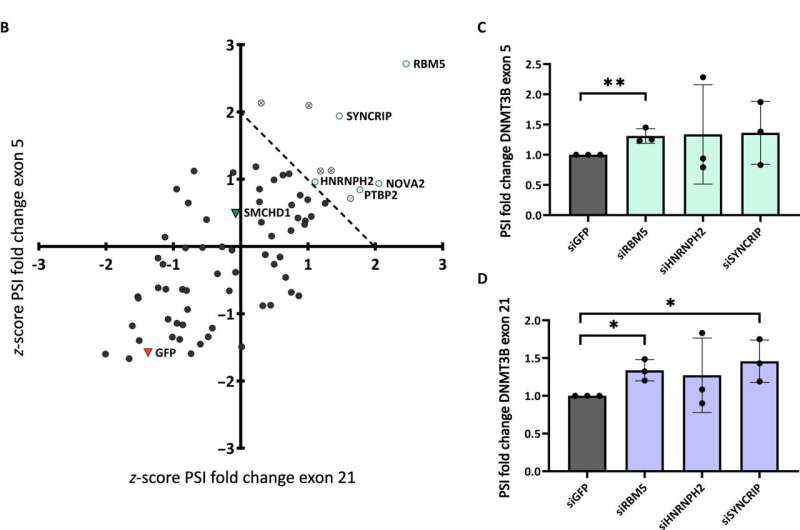This article has been reviewed according to Science X's editorial process and policies. Editors have highlighted the following attributes while ensuring the content's credibility:
fact-checked
peer-reviewed publication
trusted source
proofread
Muscle disorder caused by key protein mutations uncovered in new study

A recent study has found that the SMCHD1 protein plays a key role in controlling how genes are processed, which affects the progression of Facioscapulohumeral Muscular Dystrophy (FSHD). This discovery of SMCHD1's function in gene regulation is important because it opens new possibilities for developing targeted therapeutic strategies to combat the disease. By understanding more about how SMCHD1 works, scientists can explore new ways to fight the disease.
The study, led by MD-Ph.D. student Eden Engal under the guidance of Dr. Yotam Drier and Prof. Maayan Salton from the Faculty of Medicine at the Hebrew University, has highlighted the crucial role of the SMCHD1 protein in the regulation of alternative splicing, shedding light on the disease development of Facioscapulohumeral Muscular Dystrophy (FSHD).
This complex disorder, which leads to the progressive weakening and loss of muscle function, is driven by genetic factors. The team's findings enhance our understanding of the genetic mechanisms that underlie this debilitating condition.
The work is published in the journal Science Advances.
FSHD is one of the most common forms of muscular dystrophy, affecting approximately 1 in 20,000 people worldwide. It is caused by genetic mutations that lead to the inappropriate activation of the DUX4 gene in muscle cells and this activation disrupts normal muscle function and causes muscle cells to deteriorate over time. The severity of the disease can vary widely, with some individuals experiencing mild symptoms while others may lose significant muscle function and mobility. There is currently no cure for FSHD.
As DNA is transcribed into RNA, parts of the genes are removed from the RNA in a process known as splicing. Which parts are removed is regulated by multiple proteins and can lead to production of different proteins from the same DNA, a phenomenon therefore termed alternative splicing.
The new study found that in addition to SMCHD1's known role in regulating chromosome structure, it is also strongly affecting alternative splicing. Mutations in the SMCHD1 gene were already known to lead to DUX4 expression and FSHD, but it was not clear how.
A detailed analysis of RNA sequencing data from muscle biopsies of FSHD patients and cells genetically modified to lack SMCHD1 revealed extensive splicing errors in numerous genes due to the absence of SMCHD1. A comprehensive screening of splicing factors identified the involvement of the splicing factor RBM5 in these anomalies, and further experiments confirmed that SMCHD1 is required for recruiting RBM5 to its target RNA sites.
Among the genes whose splicing was disrupted, the researchers identified the DNMT3B gene. They have then demonstrated that the changes in DNMT3B splicing lead to reduced DNA methylation at specific sites near DUX4 which in turn cause harmful overexpression of the DUX4 gene, significantly contributing to FSHD development.
"Our findings underscore a vital link between SMCHD1 and the regulation of splicing mechanisms that, when disrupted, activate pathological processes in Facioscapulohumeral Muscular Dystrophy," stated Engal.
"This understanding opens new avenues for potential therapeutic strategies that target these splicing errors, offering hope for mitigating the disease's progression."
This research emphasizes the significant role of SMCHD1 in gene splicing regulation and its impact on the genetic foundations of FSHD, pointing to promising directions for therapeutic intervention.
More information: Eden Engal et al, DNMT3B splicing dysregulation mediated by SMCHD1 loss contributes to DUX4 overexpression and FSHD pathogenesis, Science Advances (2024). DOI: 10.1126/sciadv.adn7732



















